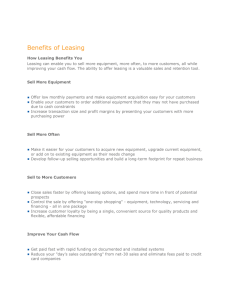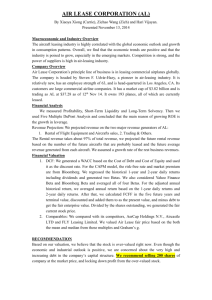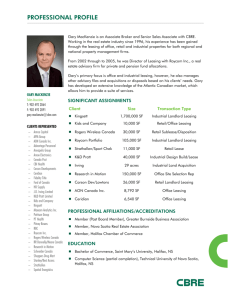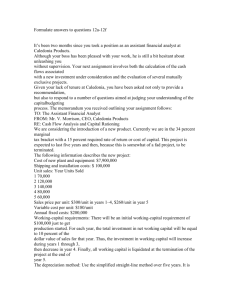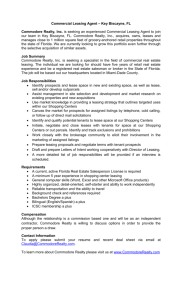Recap - Vutube.edu.pk
advertisement
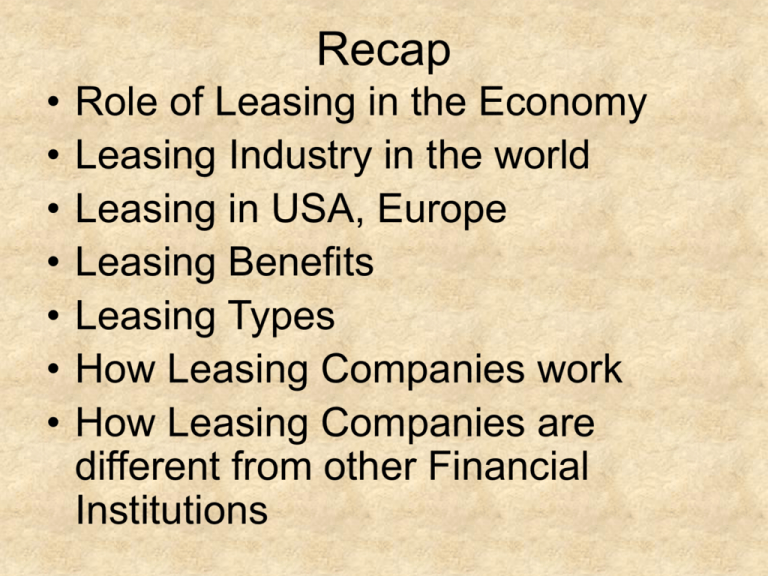
Recap • • • • • • • Role of Leasing in the Economy Leasing Industry in the world Leasing in USA, Europe Leasing Benefits Leasing Types How Leasing Companies work How Leasing Companies are different from other Financial Institutions Lecture # 34 Leasing Companies Vehicle Leasing • Vehicle leasing refers to leasing the use of a motor vehicle for a fixed or indefinite period of time. It is commonly offered by dealers as an alternative to vehicle purchase. The key difference in a lease is that after the lease expires, the lessee must return the vehicle to the dealer or buy it. No Large Outlay • The biggest advantage of leasing equipment is that the cost is spread over a number of years; there is no need for you to pay the entire amount upfront. This can significantly help maintain cash flow, which is critical to all businesses. Poor cash flow is the main cause of small business failures, and leasing can help you to keep it under better control. Rationale • Leasing offers advantages to both buyers and sellers. For the buyer, lease payments will usually be lower than payments on a car loan would be, and qualification is usually easier. Some consumers may prefer leasing as it allows them to simply return a car and select a new model when • the lease expires, allowing a consumer to drive a new vehicle every few years without the responsibility of selling the old vehicles. A lessee does not have to worry about the future value of the vehicle, while a vehicle owner does • For the seller, leasing generates income from a vehicle the seller still owns and will be able to sell or lease again once the original lease has expired. As consumers will typically use a leased vehicle for a shorter period of time than one they buy outright, leasing may generate repeat customers more quickly, which may fit into various aspects of a dealer's business model. Advantages of Commercial Leasing 1. Leasing is less capital-intensive than purchasing, so if a business has constraints on its capital, it can grow more rapidly by leasing property than it could by purchasing the property outright. 2. Capital assets may fluctuate in value. Leasing shifts risks to the lessor, but if the property market has shown steady growth over time, a business that depends on leased property is sacrificing capital gains. • Because of investments which are done with leasing, new businesses are formed. Furthermore, unemployment in that country is decreased. 3. Leasing may provide more flexibility to a business which expects to grow or move in the relatively short term, because a lessee is not usually obliged to renew a lease at the end of its term. 4. In some cases a lease may be the only practical option; such as for a small business that wishes to locate in a large office building within tight location parameters. 5. Depreciation of capital assets has different tax and financial reporting treatment from ordinary business expenses. Lease payments are considered expenses, which can be set off against revenue when calculating taxable profit at the end of the relevant tax accounting period. Disadvantages of Commercial Leasing 1. A net lease may shift some or all of the maintenance costs onto the tenant. 2. If circumstances dictate that a business must change its operations significantly, it may be expensive or otherwise difficult to terminate a lease before the end of the term. In some cases, a business may be able to sublet property no longer required, but this may not recoup the costs of the original lease, and, in any event, usually requires the consent of the original lessor. 3. Tactical legal considerations usually make it expedient for lessees to default on their leases. The loss of book value is small and any litigation can usually be settled on advantageous terms. This is an improvement on the position for those companies owning their own property. 4. Although it can be easier for a business to sell property if it has the time, forced sales frequently realise lower prices and can seriously affect book value. If the business is successful, lessors may demand higher rental payments when leases come up for renewal. • If the value of the business is tied to the use of that particular property, the lessor has a significant advantage over the lessee in negotiations. The Leasing Sector in Pakistan • From the Third World perspective where a major source of economic capital is a form of foreign or local debt, Leasing acts as a hybrid form of debt cum investment. In the 80’s, when Pakistan floated its first leasing company, the characteristic of ‘asset-based’ financing made it a more ‘Islamic’ form of lending. • (Asset based lending is a permitted form of debt-financing in Islam). From the perspective of developmental finance, Leasing provided an alternative to interest based debt. Leasing as Investment Indicator • Hypothetically, since leasing is directly related to the acquisition of an asset, indicating the Aggregate Investment in Leasing of the leasing sector, in a country and at a point in time, would indicate the amount of incremental and • fresh capital investment in a year. Hypothetically, we may ignore ‘leakages’ such as rescheduling and duplicate leasing. • The aggregate figure for ‘Investment in Leasing’ for the leasing sector in Pakistan has been ranging between PKR 18 billion to PKR 25 billion over the past few years. We do not have statistics regarding the exact percentage of new investment in plant and machinery or other income generating assets. • The cost of leasing for a Pakistani lessee averages around 20-25% per annum. The effective cost for a tax-paying lessee may be 16-20%. Assuming an 18% cost of capital (weighted average) for the lessee, the asset can only generate a net income for the lessee, • if the lessee in turn earns at least 19-21% per annum from the asset. This would only be possible in high growth sectors of the economy. • In my experience, it is rare to see a gross profit margin of 20%, especially in the manufacturing sectors who are the prime clients for leasing Plant and Machinery. The obvious and glaring fact seems to be that the biggest market of leasing cannot afford the product. The question then remains, “who is able to buy?” • The other target markets of leasing are commercial-trade/service enterprises and small pockets of manufacturers. Commercialtrade/service enterprises for obvious reasons do not invest in capital machinery. • Small pockets of manufacturers boil down to the ubiquitous multinational or the established Pakistani Group who invests in a new project or modernizes existing operations. The reason why this market may find leasing cost effective is • because their overall cost of capital is effectively low enough to absorb the cost of leasing; in effect they use an already cash rich company/division to finance a new venture. • The other possibility is that the new project has foreign equity interest, which acts as a source of comfort for the Pakistani lessor and provides support for import costs. A third reason for choosing leasing is as hedge against investing equity. • In a macro-economic scenario where debt is the lynchpin of most investment, an investor would like to reduce the risk of investing equity. Leasing as working capital • Due to the reasons stated above, the product is being used as a source of working capital and quite often as a competing product with short term loans from commercial banks. A sale and lease back transaction is an instant source of funds, payable over the long-term. • However, these days an SLB transaction is being used as a vehicle for a direct lease quite often. Because of the enhanced rate of tax at source on direct leases levied from July 98 as against a nil rate for sale and leaseback transactions, lessees prefer to show the lease as a Sale and Leaseback transaction. • At the time of processing and obtaining approval, the asset may not have been purchased; but once the lessee is assured of the financing, the asset is purchased and necessary documents processed. Lessors as financial intermediaries • With the demise of the development financial institution of Pakistan, a source of cheaper funds for longterm capital investment has driedup. The private financial sector has grown tremendously in the last decade after the IMF’s directives of liberalization and • de-regulation were effected. Greater economic efficiency, in terms of resource mobilization and allocation, was expected after the deregulation of the economy. • However, the expected economic efficiency is still a long-way away. The private sector has not been able to satisfy the long-term capital needs of the economy. Lessors are suffering from chronic mismatch of funds and lack of availability of long-term funds. • Foreign investors are a moody resource at the best of times and relying on foreign funds is a risky strategy. Contrary to the idea that the South Asian nuclear tests were responsible for driving away investors and the low popularity of Pakistan’s investment market, the absence of investors, be they foreign or local, is a symptom of deteriorating economic conditions over the past 3-4 years. Economic Cost of Leasing • Based on the principles of a ‘free market’, the true cost of leasing (from an economic perspective) is its return to the economy as a whole. If there is a marked and substantial difference between the rate of return of the lessor and the cost of the lessee (like in Pakistan), • there may be inefficiency in the sector—a big gap in demand and supply or some other disequilibrium. Of-course, this is not true for manufacturing sectors and other services and products where the value added to a product is perceived to be high. • In the financial services, value added cannot be high due to the nature of the product. In Pakistan, the net profit margin of the lessor ranges between 3% and 5%. The cost of lease to the lessee is 18-20%. Where is the bulk in between the two going? Who/what is earning this difference and • Who is being burdened with the cost of the difference? • Poor credit policy, corruption, high uncertainty and poor quality of information available are a few of the symptoms and reasons for the disparity in returns. • The ‘real’ reason may well be the outflow of capital from developing countries to the developed countries like the USA, because of the ‘dollarization’ of their economies ... and consequent rapid devaluation of their own currency. Recap • Vehicle Leasing • Advantages of Commercial Leasing • Disadvantages of Commercial Leasing • The Leasing Sector in Pakistan • Leasing as Investment Indicator • Leasing as working capital • Economic Cost of Leasing
